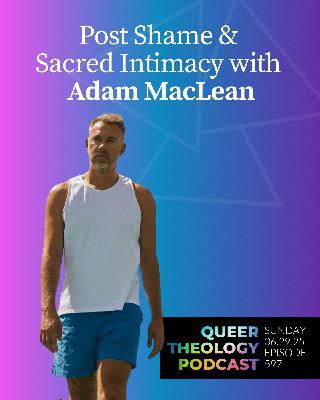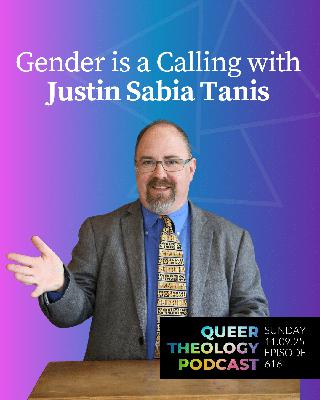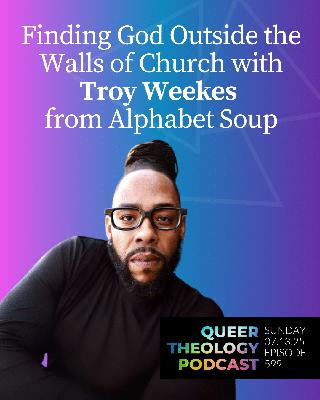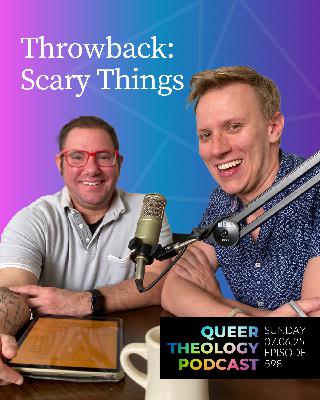Post Shame & Sacred Intimacy with Adam MacLean
Description
We’re joined on the podcast this week by Adam MacLean (@adammacattack) who is the founder of PostShame.org and #PostShame, online tools designed to help people examine their past for things they worry might leak on the internet, and then proactively share those stories themselves. By doing so, they transform these stories into narratives of strength and leadership, offering support to others struggling with similar challenges. He is also the host of the podcast
“Find Your Light with Adam MacLean”, where he navigates difficult conversations around shame, leadership, and self-acceptance. In these discussions, Adam integrates his expertise in holding space for others, helping listeners work through challenges related to the body, mind, and spirit—particularly within the realms of sacred intimacy.
In this conversation, Brian and Adam delve into the complexities of shame, particularly within the LGBTQ community. They explore the concept of post-shame, the impact of the internet on personal narratives, and the distinction between guilt and shame. Adam shares his personal journey, including his experiences with spirituality and 12-step programs, and how these intersect with his queerness. The discussion also touches on the significance of rituals in creating meaning and community, culminating in reflections on marriage and personal transformations. In this conversation, Adam and Brian explore the complexities of shame, relationships, and the impact of online culture on personal identity. They discuss the PostShame process, which helps individuals confront their pasts and navigate the challenges of public scrutiny. The dialogue delves into the nuances of sexuality, consent, and the importance of context in conversations about intimacy. They also touch on the experiences of men in today’s society, the distinction between erotic and pornographic expressions, and the significance of gender affirmation in personal journeys.
Takeaways
- Dissolving shame is essential for self-acceptance.
- The internet amplifies the experience of shame.
- Guilt is about actions, while shame is about self.
- Community plays a crucial role in healing from shame.
- Rituals can help create meaning in our lives.
- Personal narratives can be transformed through sharing.
- Spirituality can be redefined outside traditional structures.
- Queerness and theology can coexist harmoniously.
- Self-expression is a radical act of love.
- Marriage can mark a significant shift in relationships. We can only make commitments in our relationships.
- Online shaming is not evenly distributed.
- The PostShame process helps individuals reclaim their narratives.
- Navigating shame involves understanding context and consent.
- Sexuality and shame are often intertwined in complex ways.
- The distinction between erotic and pornographic is crucial.
- Healing can involve somatic practices and intimacy.
- Men often struggle with loneliness and connection.
- Trans experiences challenge traditional notions of gender.
- Dissolving shame is a shared mission for many.
Chapters
03:05 – The Birth of Post-Shame and Personal Journey
07:11 – Understanding Guilt vs. Shame
10:09 – The Role of the Internet in Shaming
11:45 – Revisiting 12-Step Programs and Spirituality
14:55 – The Intersection of Queerness and Theology
19:19 – Rituals and Their Significance in Community
21:57 – Personal Reflections on Marriage and Rituals
31:46 – Interrogating Language and Relationships
33:14 – Moving Beyond Shame
34:28 – The PostShame Process
36:46 – The Impact of Online Shaming
38:07 – Navigating Sexuality and Shame
39:40 – Context and Consent in Conversations
42:46 – The Distinction Between Erotic and Pornographic
47:34 – Sacred Intimacy and Healing
50:27 – Male Loneliness and Connection
56:12 – Trans Experiences and Gender Affirmation
Resources:.
- Learn more about Adam at https://www.postshame.org/adammaclean
- Join our online community at Sanctuary Collective Community
If you want to support the Patreon and help keep the podcast up and running, you can learn more and pledge your support at patreon.com/queertheology
This transcript was generated by AI and may contain errors or omissions.
(9s):
Welcome to the Queer Theology Podcast. I’m Brian G Murphy. And I’m father Shannon, T l Kearns. We’re the co-founders of Queer Theology dot com and your hosts from Genesis, revelation. The Bible declares good news to LGBTQ plus people, and we want to show you how Tuning in each week on Sunday for conversations about Christianity, queerness and transness, and how they can enrich one another. We’re glad you’re here. You all are in for a treat. Today we have Adam McLean joining us for a conversation about lots of things. The big one, the center of it is shame and it’s inverse, or, well, I guess we’ll find out if it’s in the inverse pride. I know that as L-G-B-T-Q people, almost all of us probably struggle with shame in some way, shape or form.(56s):
And I’m really excited to have this conversation with you, Adam, to bring sort of a new light to the various ways shame shows up in our lives and in particular in this new millennium. So you’re the founder of the hashtag PostShame, the Post Shame org website. You’ve also got a podcast, Find Your Light with Adam MacLean, where you have these difficult conversations around shame and leadership and self-acceptance. And I know from your work that a big part of that is developing tools to help people examine the things in their past that they might worry about, and then proactively share those stories themselves and, and doing so transform the stories and their narratives around those stories. And so like, wow, such important, I would even call it holy work that you’re doing.(1m 42s):
I love, I love the idea of calling it holy work. My long journey around being okay with using words like secret and holy and divine. I’ve, I’ve arrived in my forties being like, those are okay. Words to say. So I’m really having that, that’s that, that you’re, that you’re doing the type of work you’re doing and, and you’re stitching together all these sometimes disparate subjects. But it turns out we’re all, we’re all going in the same direction. We’re all trying to focus on the same thing. And dissolving shame turns out to be, I think, the great work of our time. Yeah, it’s been so misapplied, it’s been so misutilized, and I think in a lot of sacred spaces, especially like churches, sometimes it can be so weaponized and how cool that you’re leading a movement of people who are kind of squaring their faith and their sexuality and making it make sense.(2m 40s):
So thank you for the work that you’re doing. Well, You’re welcome. Thanks for being here. So you kind of keyed us into perhaps like a little bit of your backstory when you said you’re recently arriving to this place where it feels comfy to describe your work as as holy or sacred. And so can you share a little bit about your background that maybe made those words for a time being like not feel so safe or comfortable or accurate? Right. Well, I’ll start with The Birth of Post shame.org. I wanted to run for office. And in 2016, after the first time that Hillary won more votes than Trump, just a reminder, she won more votes, but she wasn’t allowed to become president. And I was like, the world’s on fire.(3m 20s):
It’s time. I’m just gonna have to run for office. So I started to do opposition research on myself and assemble a team and like put things together. And I realized that I had all these naked images of me on the internet, some consensual, some non-consensual, and this was something I needed to deal with. And during the process of trying to figure out how to reconcile all that and make it so I could run for office, I realized that a bunch of millennials and Gen Z folks were kind of opting out of politics writ large because the internet is such a scary place and your whole past gets piled onto the internet. And then it’s just this scary place to kind of try to be a human. And yeah, I know. Yeah, the internet’s a scary place.(4m 1s):
So I started in what I really thought was a very secular endeavor, you know, kind of coping with online shaming how who gets shamed for what and why online. And the, you know, the conversation essentially became what is shameful. And I was like, oh gosh, yeah. I don’t think being gay is shameful at all, but that’s because I’ve had this like, you know, evolving life where as a teenager, okay, quick, quick, quick story time. Go back to like, me as a teenager, I grew up Episcopalian in Buffalo, New York, and I was going to confirmation class because my Jewish friends all had bar and Bat Mitzvahs.(4m 48s):
And I was like, that sounds like an amazing party. I don’t understand why I don’t get one of those. And then my friends at, at the Epi Episcopal Church were like, well, you can get confirmed. And I was like, do we get to have a Bar mitzvah? And they were like, not exactly, but you know, go get confirmed and you know, we can have a party. And so I start teaching the confirmation classes and the person teaching them was like, all right, go home and please get
























